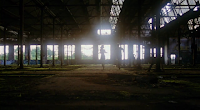DVD Review: Breaking and Entering
Breaking and Entering is a very broad premise about how messing up makes you a better person. Philosophically it could have worked, as the late writer/director Anthony Minghella made one of my favorite films The Talented Mr. Ripley. But where that film was masterful at letting editing speak for the characters intentions, Breaking and Entering insists on spelling everything out with its absurd amount of heavy-handed dialogue.
The film is an obvious metaphor for class warfare in modern day London. Jude Law plays Will, the head of a development firm who is looking to revitalize a slummed area by building a giant, eco-friendly community in its place. When multiple break-ins occur Will is forced to stake out his own building to try and catch the thieves that have made off with his companies computers, not to mention his own personal laptop.
This laptop is the main catalyst that brings a bunch of the characters together. Miro, the boy who stole the computer, looks at the pictures on Will's desktop of Will and his longtime girlfriend Liv (Robin Wright Penn) and dreams of happier times when he and his family were together in Bosnia. He lives with his mom Amira (the always good Juliette Binoche) who is a tailor. When Will espies Miro trying to break into his business a third time he follows him to his house and comes up with a plan to inquire about his missing stuff. However, what happens is Will is smitten with Amira and of course everything dominoes from there in typical melodramatic fashion.
The film is interesting for about the first hour or so, only because I had no idea where Minghella was taking me with his story. However, that's where the interests dies as Manghella – working from his own script for the first time since his debut film Truly, Madly, Deeply – paints with too broad of a brush. There are countless metaphors that could have worked if it weren't for the characters constantly drawing attention to them. A few examples include a fox that wanders outside of Will and Liv's apartment representing the wild side that Will is trying to seek in his affair with Amira. When the fox shows up dead in his car – a car that was stolen by a prostitute he befriended while staking out his business – the message is loud and clear as it comes after he has slept with Amira. Another example: Liv has a daughter who may be autistic and who loves gymnastics. Liv was once an award winning documentary filmmaer, but now all she does is film footage of Bea (her daughter). The unknown symptoms that plague her daughter take their toll on Will and Liv as they walk a tightrope throughout the film of staying together for the kid, or just severing ties and ending the charade. Bea spends most of her scenes trying to balance herself, either in her room or on a balance beam. Ugh. Minghella also isn't subtle with his film techniques as he is constantly blurring images, masking the screen, or using insane amounts of synecdoche.
Will even mentions at the end how much he loves metaphors, and proceeds to explain to the audience – as if we're dolts (but then again I guess we are for having just sat through this film) – some of the metaphors that were in the film, specifically how he views his life like a "circle" (community of family), but he sees it more as a "cage" (the imprisonment men feel in a relationship). Puh-lease. It's all moot anyway by the end as Will, the one trying to get out of the relationship by having an affair, threatens an angry Liv with marriage. They argue...and then they embrace. I didn't get it, either..oh wait...that's right, we have to mess up in order to find what we really want. Again, it wouldn't have been such a bad premise (and that first hour really sets you up to believe that this film is going to have ideas) if there was any inkling that the filmmakers understood the value in underplaying their hand.
Breaking and Entering is just way too melodramatic, and the ending comes off as being too much like a soap opera where everyone apologizes with little regard for the wrong they've done, for the film to be an effective dramatic experience. It's no surprise that Sydney Pollack produced the film (as he did other Minghella films), and not only does this feel like a Sydney Pollack film (read: deliberate pacing), it's also very British, and the only reason I think this movie was allowed to be made was because of the clout of its writer/director and producer.
It's sad that I have to say this about the final film Minghella left us with, because I'm sure he had another great movie in him. I was excited about watching this, the only Minghella film I had yet to see, and in no way should this film or my review of it tarnish his other films. I've already made my feelings known about The Talented Mr. Ripley, but consider too how he does melodrama successfully with The English Patient and Cold Mountain, two films that were over praised upon their initial theatrical run, but reveal themselves today as good examples of well executed melodrama, not just Oscar fodder. Unfortunately the best thing about Breaking and Entering may have been the use of Sigur Rós' "Sé lest" at the end of the film.



















I liked this film because it was entertaining and it was different than most films you see today. I thought the acting was good and the story was great.
ReplyDelete